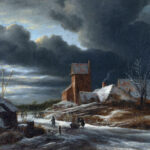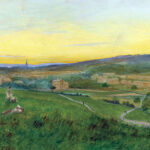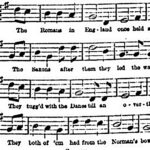10 May 1784: The punishment regime at the waged spinning school for young factory girls launched today at York by the philanthropist Catharine Harrison
Catharine Cappe. 1800. An Account of Two Charity Schools for the Educations of Girls. York: William Blanchard. Get it:
.Unedited excerpt
If an excerpt is used in the book, it will be shorter, edited and, where applicable, translated.
ON THE SPINNING SCHOOL.
THE plan of this Institution was first suggested by a circumstance merely accidental. Towards the close of the year 1782, Mrs. Gray and myself, painfully impressed by the behaviour of a set of Children employed in a Hemp Manufactory in our neighbourhood, feeling deeply for their ignorance, and for the innumerable evils to which, particularly the Girls employed in it, were exposed, determined to try if something could not be done to mend their condition.
Our first thought, was to have them taught to read, knit, and sew, in an evening after they had finished their work in the Manufactory, and that a person, whom we meant to engage, should accompany them to Public Worship on the Sunday. The month of October was principally spent in drawing plans, making the necessary arrangements, &c. and on the 7th of November, having been encouraged by some donations and subscriptions from a few particular friends to whom we had communicated our design, Twenty-two young Girls were entered with a Mistress whom we had engaged to teach them.
Early in the year 1783, we were joined by Mrs. Withers, who immediately took an active part; and towards the close of it, by the Dowager Lady Anderson, and the Lady of Dr. Withers.
Throughout the whole of this year we made every effort in our power for the benefit of the girls employed in this manufactory, but at length, finding it in vain to hope for any effectual reformation, while they continued under the influences to which their situation there exposed them; and feeling a more peculiar interest for those individual children, in whose behalf we had thus exerted ourselves, we determined to try if we could not rescue them from their perilous situation, by endeavouring so to augment our little subscription, as to establish a School for the Spinning of Worsted, and thus enable ourselves to make the parents of these children an offer of allowing them wages equal to what they then earned, and of placing them under our own protection.
We were further stimulated to make the attempt of establishing a Spinning School, from considerations of a more general nature, such as the great want of some Institution, whereby the children of the poor might gain habits of industry in a City like York, where many of the Mothers, obtaining a livelihood by going into families as washer-women and char-women, and not being able to afford the expence of sending their children to school, leave them at large in the streets, by which, girls, especially, acquire habits extremely ruinous to themselves, and hurtful to the whole community.
On the 10th of May, 1784, circumstances having arisen, to make it necessary to take immediately some decisive step respecting the Girls employed in the hemp manufactory, we sent for the Parents of these children, making them the offer already mentioned, which several accepted; and that very evening, eighteen young Girls were placed by their parents under our protection. We had, however, still a Room to hire, a Spinning Mistress to engage, Wheels, and proper materials to procure; which prevented us from putting our plan into regular execution till the 1st of July following.
During the whole of 1784, some part of every day was occupied either in contriving the different arrangements, or in making the necessary efforts to put them in execution. The difficulties to be surmounted were various, and discouraging; some of them arising from circumstances merely local, I shall not enumerate; others, of a more general nature, and which will probably always be met with at the commencement of similar undertakings, it may be useful to mention:
First, the irregular attendance of the children. Unaccustomed at home to habits of order and regularity, it is extremely difficult to make either themselves or their parents comprehend the necessity of acquiring such habits.
Secondly, the difficulty of devising effectual punishments, and of putting them in execution. Among the lower classes, a child is beaten by the parents for every little offence, and sometimes, if the parents happen to be in a bad humour or any thing goes wrong, for no offence at all; corporal punishment therefore if it could be resorted to, (which however I am persuaded in such Institutions it never ought to be) would want much of its effect from this very circumstance, that the children have been accustomed to be thus treated, whether with or without any adequate cause, at their own homes. No means of punishment therefore seemed to remain; but little privations on the one hand, and marks of disgrace to be inflicted on the other. In respect of the first, as in general these privations cannot take place immediately, their effect is considerably weakened; and as to the second, if not administered with great prudence and with a sparing hand, they will not only cease to be felt as any punishment at all, but may do much mischief by early destroying that acute sense of shame and disgrace, which among persons decently educated, is the most powerful preservative of virtuous conduct. For instance, if a child spin thick, be idle, or waste her wool, it may be useful for the Mistress to turn her bed-gown or to pin some of the thick spun wool to her shoulder, threatening that if she be not more careful and more industrious, she shall be so exhibited to her Patronesses, or other accidental Visitors of the School; but this threatening, if it can be avoided should not be put in execution. The disgrace should be removed the moment it seems to make impression, and should not even be mentioned by the Mistress to the Visitors in the hearing of the child; for the dread of being exposed will operate much more powerfully upon a child who believes that those whom she most respects are ignorant of her fault, than if she knows that they are already made acquainted with it. Much less ought such kind of exhibitions ever to be made out of School. Public disgrace of any kind, would really be disproportioned to the fault committed, and besides the feeling of resentment it would excite, both in parents and children, would be likely to produce the most pernicious effects on the whole of their future character.
Another difficulty in such undertakings, is the finding a proper Mistress. From what has been just remarked on the subject of punishments, it is obvious, that the orderly conduct of the children, their industry and improvement of every kind will greatly depend, on the good sense, the firmness, the self-command, the forbearance, and the kind dispositions of her who fills this important place. But these are qualities not usually met with in persons who are willing to accept of such an employment. We did not succeed in finding one who would at all answer our wishes, although we made every enquiry in our power, and made trial of several, till April, 1785, when we engaged a person from Halifax, who came to fix in York on our account, and from that time the affairs of the School went on much more prosperously than they had done before. This person really possessed the requisite good qualities, understood spinning and the various branches of manufacture connected with it, could make out the accounts to the Manufacturers, was strictly honest, and had a decency of manner and behaviour, the result perhaps of having filled a better station, which enabled her to preserve a proper authority, without having recourse to severity. She remained Mistress of the School till the year 1796, when circumstances arising which made it inconvenient to her to continue in that situation, she requested leave to resign; and since that time the great difficulty of finding a proper Mistress has again been experienced.
In the Summer of 1785 we were joined by Miss Hasell, who from that time to the present has been an important Patroness of the Institution, and at the close of this year we first published a printed Statement of the Subscriptions received, Money expended, &c. also some account of the objects of the Institution.*
In the year 1786, a Knitting School was added for the reception of children too young to spin worsted. From this the Spinners are taken as vacancies happen in the Spinning School, and as they become eligible by knitting a stocking in the course of a week, which is previously required.
Many applications having from time to time been made from different parts of the Kingdom for an outline of our plan, with a view to the establishment of similar Institutions, a short account of the ends and objects aimed at, also of the mode in which the Institution was conducted, was drawn up and printed at the close of the year 1789.
As soon as the children can spin four hanks of wool per day, they are decently clothed, and moreover as an encouragement they receive one fourth of their earnings in money at the end of the week, it being found that a present benefit, however small, has more influence over the parents of such children, as well as over the children themselves, than an advantage which is more distant, although its magnitude should be much greater. They make their own clothes, which is a further advantage, as by that means they receive some instruction in sewing from the Knitting Mistress, who has two of the Spinners constantly for a month in rotation under her care for that purpose. It would have been much more agreeable to these parents, and would have occasioned much less trouble to the Ladies who superintend the School, if the children were to receive the whole of their earnings in wages, without having any clothes given them; but if they were not clothed, many of the children would be sent in such a state as would render this very superintendance, in itself so necessary, nearly impracticable; and beîides, without this, any material change in their manners and behaviour could hardly be expected, decency of apparel being more closely connected with decency of character, than may at first sight seem evident.
The quantity of clothes given to the Spinners, is regulated by a fixed rule, bearing proportion to the earnings of the individual, an account of which is regularly set down every night by the Mistress, in a Book kept by her for that purpose, which is overlooked by the Lady, who, for the time being, pays the wages, and adjusts the rewards at the close of every week. She also states the various particulars of what has been received or expended, in the papers printed annually and distributed to the Subscribers at the end of the year.
Till within the last four years the Writer of these papers transacted this business, and moreover, together with the other Ladies who from the first were coadjutors, superintended every thing that related to the Institution. At length finding the time engrossed by this constant attendance incompatible with other duties, Mrs. Dr. Withers and Miss Barton took the care of the Books, Expenditure, Yearly Statement, &c. and to their unwearied exertions since that time the Charity has been much indebted.
Comment
Comment
Something to say? Get in touch
Similar
 1 July 1840: The opening of the Hull and Selby Railway terminates the threat to Hull’s port from Goole, Scarborough and Bridlington
1 July 1840: The opening of the Hull and Selby Railway terminates the threat to Hull’s port from Goole, Scarborough and Bridlington 10 March 1665: Blizzards and Dutch attacks prolong Restoration-induced shortages of fodder and coal at Northowram (Halifax)
10 March 1665: Blizzards and Dutch attacks prolong Restoration-induced shortages of fodder and coal at Northowram (Halifax) 30 May 1835: Alfred Austin, future poet laureate, “Banjo-Byron that twangs the strum-strum,” is born into rural splendour at Ashwood, 48 Headingley Lane, Leeds
30 May 1835: Alfred Austin, future poet laureate, “Banjo-Byron that twangs the strum-strum,” is born into rural splendour at Ashwood, 48 Headingley Lane, Leeds
Comment
Comment
Some background to the novel:
D. F. E. Sykes, a Huddersfield solicitor married to the daughter of an Anglican clergyman, focused in Ben o’ Bills, The Luddite, which the author claimed to be based on oral testimony and ‘mostly true’, on a fictional family, the Bamforths, connected with the Particular Baptists at Powle Moor, near Slaithwaite, where the minister, Abraham Webster, was so decidedly against the new machines that old Mrs Bamforth ‘died in the belief that the curse of Scripture was upon them’. George Mellor, a cousin of the Bamforths in the novel, enters the story on Christmas Eve, 1811, intoning the first verse of ‘Christians Awake’. He goes along with the rest of the family to Christmas morning service at Slaithwaite Church, where ‘near all Slaithwaite’ had gathered ‘Methodies and Baptists and all; and even folk that went nowhere, Owenites they called them’, who ‘made a point of going to church that one morning of the year’. Mellor, who occasionally speaks in moderate tones, but elsewhere gives vent to Painite anti-clerical and republican sentiments, is portrayed presiding at a Luddite oath-taking ceremony with a Bible to hand. He refers to Benjamin Walker, the accomplice who betrayed him, whose family Sykes also links with the Baptists at Powle Moor, as a ‘Judas’, He is visited twice in his York prison cell by Abraham Webster, who prays with him on the eve of his execution. According to Sykes, this final pastoral visit inspired Mellor to offer words of forgiveness for his enemies from the scaffold, though Sykes was clearly using dramatic licence in allowing Webster to lead the singing of a Methodist hymn at Mellor’s execution, since all the contemporary accounts record this as a feature of the execution of another group of Luddites. At the end of the novel, Soldier Jack, a former militia-man-turned-Luddite, reflecting on Mellor’s fate, philosophizes: ‘”Yo’re dissenters at th’ Powle … an’ … if there’d been no dissenters there’d been no Luds, ‘an George Mellor ‘d noan ha’ danced out 0′ th’ world on nowt”‘.
Much of the background to Sykes’s novel is authentic, as are several of the key characters, including Abraham Webster, the Baptist minister at Powle Moor, the Reverend Charles Chew, the curate at Slaithwaite and the Luddites George Mellor and Benjamin Walker. A succession of popular evangelical Calvinistic Anglican curates in the Venn tradition at Slaithwaite and the reluctance of the earls of Dartmouth to release land on their estates for the building of Nonconformist places of worship had delayed the local development of both Wesleyanism and Dissent, a factor of which Sykes was clearly aware in his reconstruction of popular religion in the Colne Valley. In fact, no Wesleyan chapel was built at Slaithwaite until 1839, though a chapel had been opened in 1810 at Linthwaite, the first to be built in the Colne Valley, and cottage meetings were begun at Marsden in the same year. The Baptist secession had occurred as recently as 1787 and the Powle Moor Chapel was built· three years later on moorland waste in the neighbouring township of Scammonden, having been denied building land on the Dartmouth estates in the Colne Valley. The most recent historians of the chapel have, however, found no evidence in the chapel records to corroborate the links between Sykes’s characters and the chapel and dismissed Sykes’s account as purely fictional.
(Hargreaves 1990)
See also the official record of the trial (Howell 1823).
Something to say? Get in touch
Search
Donate
Music & books
Place-People-Play: Childcare (and the Kazookestra) on the Headingley/Weetwood borders next to Meanwood Park.
Music from and about Yorkshire by Leeds's Singing Organ-Grinder.



 Bluesky
Bluesky Extwitter
Extwitter